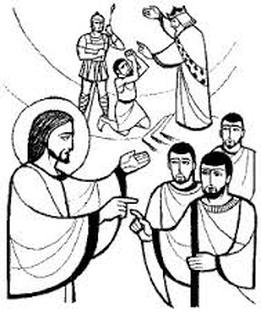On October 31st, 1517 Martin Luther nailed his Ninety Five Theses on the door of the Castle Church in Wittenberg, Germany. While this event is known as the starting point of the Lutheran Reformation, Luther's theses are by no mean the be and end all of Lutheran teaching. Rather, they got the discussion going. His theses questioned the power of indulgences, which the Roman Church was selling to people promising to save them from purgatory. Luther's questioning of such a practice pushed him into the forefront of the most important discussion in Christian history.
"How am I saved?" Every human being concerned for his own soul asks this question. "How do I know, if I were to die right now, whether I am going to heaven or hell?" This is the question Luther asked himself.
If you were to sum up the Lutheran Reformation into one sentence, you wouldn't cite Luther's Ninety Five Theses. Rather, you'd recite the Fourth Article of the Augsburg Confession written by Luther's good friend, Philip Melanchthon, "Our churches also teach that men cannot be justified before God by their own strength, merit, or works, but are freely justified for Christ's sake through faith when they believe that they are received into favor and that their sins are forgiven on account of Christ, who by his death made satisfaction for our sins. This faith God imputes for righteousness in his sight (Rom. 3, 4)."
This is what it means to be a Lutheran. This is not simply the confession of a dead German or even a bunch of dead Germans. This is the confession of every Christian, whose confidence is in Christ Jesus alone. We believe, on the solid basis of holy Scripture, that God justifies us through faith without our works.
Our Epistle Lesson today gives you solid ground to defend this confession on justification and have certainty that if the world were to end right now, you're going to heaven.
St. Paul writes, "Now we know that whatever the law says it speaks to those who are under the law, so that every mouth may be stopped, and the whole world may be held accountable. For by works of the law no human being will be justified in his sight, since through the law comes knowledge of sin." (Rom. 3:19-20)
What is the law? The law is the love God commands of us. We learn of this commanded love in the Ten Commandments, "You shall have no other gods. Honor your Father and Mother. You shall not murder. You shall not commit adultery. You shall not steal." Of course all these commands can be summed up with, "Love the Lord your God with all your heart, soul, and mind, and love your neighbor as yourself." (Matthew 22:37-40) If you keep this law perfectly you are righteous, that is, God finds no fault in you. And you will live forever in heaven. So, you would think that the law justifies you before God and gives you eternal life. Yet, St. Paul writes, "For by works of the law no human being will be justified in [God's] sight, since through the law comes knowledge of sin."
The law only justifies you if you follow it perfectly. But if you fail at one point to love God or your neighbor, the law accuses you of sin. St. Paul writes, "For all have sinned and fall short of the glory of God." The law holds the whole world accountable to God. This is why St. Paul writes, "by works of the law no human being will be justified in [God's] sight." What does it mean to be justified in God's sight? To be justified means to be declared righteous. A righteous person has no sin, he's innocent before God. You must be justified to go to heaven. If you are unjust, you will go to hell. This is why the question, "How am I justified?" is so important. It is really asking, "How do I get to heaven?"
It is because of St. Paul's words, "by works of the law no human being will be justified in [God's] sight" that our Lutheran Confession states, "men cannot be justified before God by their own strength, merit, or works." The preaching of God's law will always accuse you of your sin. And when you look at your attempts to keep God's law, you will see that you deserve to go to hell. Your works cannot save you.
So how are you justified before God? Our Confession states, "[Men] are freely justified for Christ's sake through faith when they believe that they are received into favor and that their sins are forgiven on account of Christ, who by his death made satisfaction for our sins." And where did they get this answer? Again, St. Paul writes, "But now the righteousness of God has been manifested apart from the law, although the Law and the Prophets bear witness to it- the righteousness of God through faith in Jesus Christ for all who believe. For there is no distinction: for all have sinned and fall short of the glory of God, and are justified by his grace as a gift, through the redemption that is in Christ Jesus, whom God put forward as a propitiation by his blood, to be received by faith."
You are justified before God through faith in Jesus' Christ. That is, God declares you innocent of all your sins and accepts you into heaven when you believe that Jesus Christ died for your sins and gives you eternal life.
How can this be? How can you be given eternal life, while you are a sinner? How can you go to heaven when God's law condemns you to hell? The answer is Jesus! God sent him to bear all your sins and suffer in your place. John the Baptist proclaimed, "Behold the Lamb of God, who takes away the sin of the world!" (John 1:29) So while the law condemns the whole world, because of their sin, Jesus Christ takes the sin of the whole world away.
Jesus Christ is truly a man, born of the Virgin Mary as Scripture clearly teaches (Matthew 1:18-25; Luke 1:30-35) and as we confess in our Creed. This man lived a perfect life under the law (Galatians 4:4), he is truly righteous. Yet, to fulfill God's will, Jesus was punished for the sins of the whole world, as Isaiah prophesied, "the Lord has laid on him the iniquity of us all." Christ Jesus suffered not only physical abuse, but God's righteous wrath against all sin. Jesus was condemned as your substitute for your sins. And because Jesus is not just a man, but also true God his death satisfies God's wrath against all sin. This is what St. Paul means when he says, "whom God put forward as a propitiation by his blood." To propitiate means to satisfy God's wrath, to make God look favorably upon us. Christ's blood removes our sins from God's eyes. This is why St. John writes, "the blood of Jesus his Son cleanses us from all sin." (1 John 1:7)
It is Jesus and Jesus alone who satisfies God's wrath and forgives all your sins. This is why St. Peter preached, "And there is salvation in no one else, for there is no other name under heaven given among men by which we must be saved" (Acts 4:12)
So it is not by works that you have done that you are saved, but by faith in Jesus Christ. St. Paul writes in Ephesians 2, "For by grace you have been saved through faith. And this is not your own doing; it is a gift of God, not a result of works, so that no one may boast." But what is faith? Well, faith means to believe? But St. James writes, "You believe God is one; you do well. Even the demons believe- and shudder!" (2:19) The better question is, "What is justifying faith?" Justifying faith is not simply historical knowledge that Jesus is God and man and died on the cross. Rather, faith, which justifies trusts in the promise that your sins are truly forgiven for Christ's sake. Our Confession states, "[Men] are freely justified for Christ's sake through faith when they believe that they are received into favor and that their sins are forgiven on account of Christ." This faith is not simply knowledge of God, but trust that God truly forgives your sins for Christ's sake.
"This faith God imputes for righteousness in his sight," our Confession states. This means God counts your faith as righteousness. This is what it means to be justified, to be counted righteous by God. This is biblical. St. Paul writes, "For if Abraham was justified by works, he has something to boast about, but not before God. For what does the Scripture say? 'Abraham believed God, and it was counted to him as righteousness.'" (Romans 4:2-3) Abraham believed in the promise of God, so God considered Abraham righteous. So it is with you. You believe in God's promise to justify you for Christ's sake and you are justified before God.
For a person to be justified before God, he must first repent of his sins. This is an important difference between faith, which is plain knowledge, and justifying faith, which saves. If you are sorry for your sins you will take great comfort in the promise that God forgives all your sins for Christ's sake. If you are not sorry for your sins, you will despise the promise of God's forgiveness. It is impossible for someone to have saving faith, while refusing to repent and continuing to sin openly and without fear of God. It is impossible to separate repentance from faith in God's promise to forgive sins.
If you want to be justified by God, you want to be forgiven. It's the same thing. St. Paul writes, "Now to the one who works, his wages are not counted as a gift, but as his due. And to the one who does not work, but believes in him who justifies the ungodly, his faith is counted as righteousness, just as David also speaks of the blessing of the one to whom God counts righteousness apart from works: 'Blessed are those whose lawless deeds are forgiven, and whose sins are covered; blessed is the man against whom the Lord will not count his sin.'" (Romans 4:4-8)
If you are a sinner you are not righteous. The difference between a righteous person and a sinner is sin. Forgiveness is the removal of sin. So God makes a righteous person out of an ungodly sinner by forgiving his sins for Christ's sake. So sinners, who are sorry for their sins find great comfort in the Gospel, because they know that if they were to be judged by God according to their own works, they would be condemned.
This teaching of justification through faith is the most comforting message in the world. It is through this message that you know that you will go to heaven. If your salvation depended on your works, you would go to hell. This is why we insist that we are justified by faith alone. One could say, "Well, we are justified mostly by faith, but we must do some good works too." But even if we were saved 99.9% by faith in Jesus and 0.1% by our own works, we would remain in doubt whether we have done enough to enter heaven. Only faith entirely in Christ's forgiveness gives confidence that you will go to heaven.
Not only does faith alone give confidence, but it alone is true. St. Paul writes to the Galatians, "Did you receive the Spirit by works of the law or by hearing with faith? Are you so foolish? Having begun by the Spirit, are you now being perfected by the flesh?" St. Paul rebuked the Galatians for believing that they were justified by faith and works. When Jesus died on the cross, he died for all your sins, not some of them. This is why St. Paul writes, "for if righteousness were through the law, then Christ died for no purpose." (Galatians 2:21)
Celebrating Reformation Day is celebrating the Gospel. The Gospel is the good news that Jesus died on the cross to forgive all our sins. Faith in Jesus alone saves, because only Jesus can save. When we don't trust in our works, but in Jesus alone, we give honor to God alone. Justification by faith in Jesus alone is good news, because it gives us complete confidence in our salvation. We have no reason to fear death. Our sin cannot trouble us. Hell itself cowers from us. To be justified means that your sins are forgiven. It means that God is pleased with you. To be justified means that you have a secure home in heaven. This is why we Lutherans boldly confess with St. Paul, "We hold that one is justified by faith apart from works of the law." (Romans 3:28)
Amen.




 RSS Feed
RSS Feed